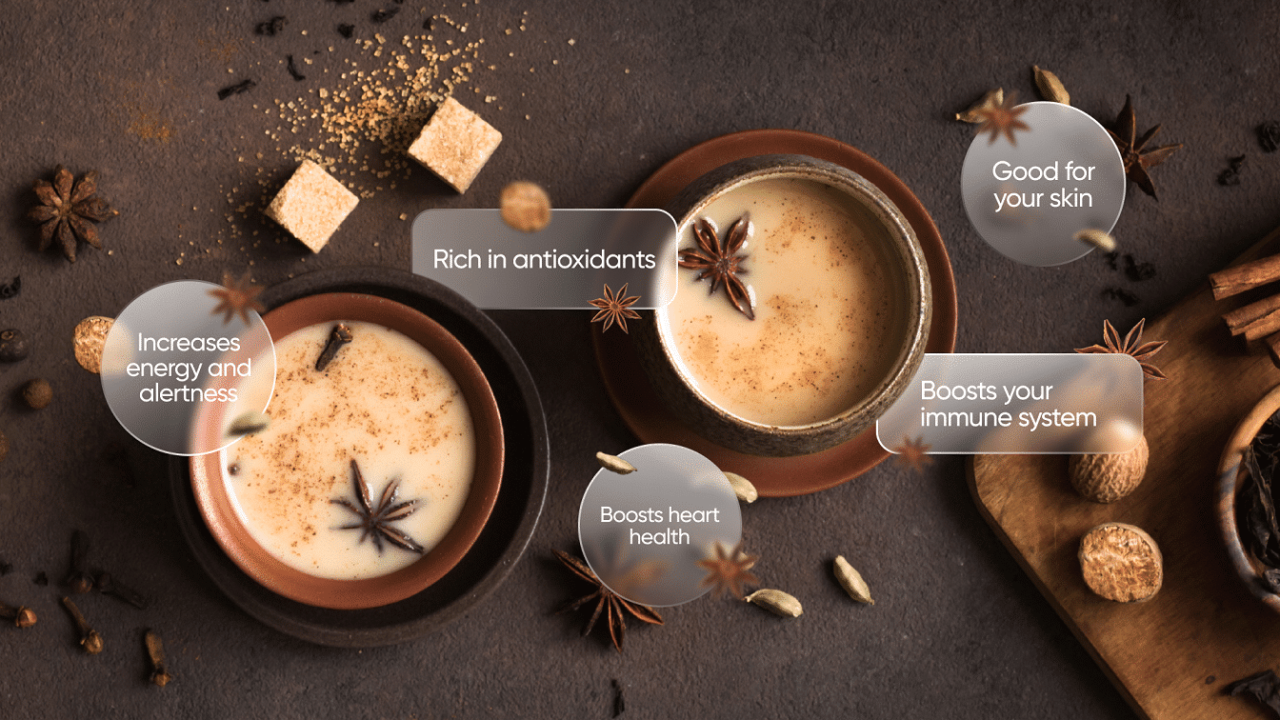Approved By » Esther Howard (Nutritionist) & Dr. Jane Cooper (Expert Dietitian)
Chai tea, a beloved beverage with roots in India, has gained immense popularity worldwide. This aromatic and spice-infused drink has become a staple in coffee shops and homes alike.
But beyond its captivating flavors, many wonder, Is chai tea good for you?
In this comprehensive article, we’ll explore the potential benefits and risks associated with this ancient elixir, shedding light on its ingredients, nutritional value, and overall impact on your well-being.
What is Chai Tea?
Before delving into the intricacies of chai tea’s health effects, let’s first understand what this beverage truly is.
Chai, which translates to “tea” in several languages, including Hindi, is a blend of black tea leaves and a harmonious mix of spices.

The traditional spice blend, known as “masala chai,” typically includes cardamom, cinnamon, cloves, ginger, and black pepper.
However, the specific blend can vary based on regional preferences and family recipes.
Is Chai Tea Good for You? – The Short Answer
Yes, chai tea can be good for you in moderation due to its antioxidant content and potential health benefits, but it’s important to be mindful of caffeine intake and added sugars.
Health Benefits of Chai Tea
Rich in Antioxidants
One of the most significant benefits of chai tea lies in its antioxidant content. Black tea, the base of chai, is rich in polyphenols, particularly flavonoids like theaflavins and thearubigins.
These potent antioxidants help neutralize harmful free radicals in the body, which can cause oxidative stress and contribute to various chronic diseases.

May Boost Heart Health
Several studies have suggested that regular consumption of black tea, a key component of chai tea, may have a positive impact on heart health.
The antioxidants present in black tea are believed to help improve blood vessel function, lower cholesterol levels, and reduce the risk of blood clots, potentially decreasing the likelihood of heart attacks and strokes.
Potential Anti-inflammatory Properties
The spices used in chai tea, such as ginger, cinnamon, and cardamom, are known for their anti-inflammatory properties.
Chronic inflammation has been linked to various health issues, including arthritis, diabetes, and certain types of cancer.
By incorporating chai tea into your diet, you may benefit from the anti-inflammatory effects of these spices, potentially reducing inflammation in the body.

May Support Digestive Health
Certain spices in chai tea, like ginger and cardamom, have been traditionally used to aid digestion. Ginger, in particular, has been found to help alleviate nausea, vomiting, and other digestive discomforts.
Additionally, the warmth of chai tea can promote better digestion by stimulating the production of digestive enzymes and improving the absorption of nutrients.
Potential Risks and Considerations
Caffeine Content
While chai tea contains less caffeine than regular coffee, it still has a moderate amount of caffeine due to the black tea component.
Excessive caffeine intake can lead to issues such as anxiety, insomnia, headaches, and digestive problems in some individuals.
It’s essential to monitor your caffeine consumption, especially if you’re sensitive to its effects.
View this post on Instagram
Added Sugars
Many commercially prepared chai tea latte beverages contain added sugars, which can contribute to weight gain, diabetes, and other health problems when consumed in excess.
To minimize the risks associated with added sugars, opt for unsweetened chai tea or consider using natural sweeteners like honey or maple syrup in moderation.
Potential Interactions with Medications
Some of the spices in chai tea, such as ginger and cinnamon, may interact with certain medications, particularly those related to blood thinners, diabetes, and cholesterol-lowering drugs.
If you’re taking any medications, it’s advisable to consult with your healthcare provider before incorporating chai tea into your diet.
Is Chai Tea Safe?
As with any beverage or food, moderation is crucial when it comes to chai tea consumption.
While chai tea offers potential health benefits, overconsumption can lead to adverse effects, particularly due to its caffeine content. It’s essential to listen to your body and adjust your intake accordingly.
Is Chai Tea Good for Your Stomach?
Yes, chai tea can be beneficial for your stomach due to the presence of ginger and other spices in the blend.
Ginger has been traditionally used to aid digestion and alleviate symptoms like nausea, vomiting, and other digestive discomforts.

The warmth of chai tea can also promote better digestion by stimulating the production of digestive enzymes and improving nutrient absorption.
Is Chai Tea Good for Weight Loss?
Chai tea itself may not directly contribute to significant weight loss, but when consumed in moderation and without added sugars, it can be a part of a weight management strategy.
The low-calorie content of unsweetened chai tea, combined with its potential to improve digestion and metabolism, could support weight loss efforts.
However, it’s crucial to be mindful of added sugars and calorie-dense ingredients in commercially prepared chai tea lattes, as they can hinder weight loss.

Is Chai Tea Good for Diabetics?
Chai tea can be consumed in moderation by diabetics, but caution is advised. The black tea in chai contains polyphenol antioxidants that may help regulate blood sugar levels.
However, many commercial chai tea lattes contain high amounts of added sugars, which can cause blood sugar spikes and are detrimental for diabetics.
Diabetics should opt for unsweetened chai tea or use natural, low-calorie sweeteners sparingly.
It’s also important to monitor caffeine intake from chai tea, as it may impact blood sugar levels. Consulting with a healthcare provider is recommended for diabetics considering adding chai tea to their diet.
Is Chai Tea Good for Pregnancy?
Chai tea can generally be consumed in moderation during pregnancy, but some precautions should be taken. The black tea in chai contains caffeine, which should be limited to 200mg or less per day during pregnancy.
Excessive caffeine consumption has been linked to an increased risk of miscarriage and low birth weight.

Additionally, some of the spices in chai tea, like ginger and cinnamon, may potentially affect blood sugar levels or interact with certain medications.
It’s advisable for pregnant women to consult with their healthcare provider before incorporating chai tea into their diet and to avoid excessive consumption.
Sticking to one or two cups per day of unsweetened chai tea is likely safe for most pregnancies, but individual circumstances should be considered.
Final Thoughts
In conclusion, chai tea can be a delightful and potentially beneficial addition to a balanced diet.
Its rich antioxidant content, potential anti-inflammatory properties, and digestive benefits make it an appealing choice for those seeking a flavorful and healthful beverage.
However, it’s essential to be mindful of the caffeine content, added sugars, and potential interactions with medications.
By enjoying chai tea in moderation and being mindful of your individual needs and preferences, you can reap the potential benefits while minimizing the risks.

